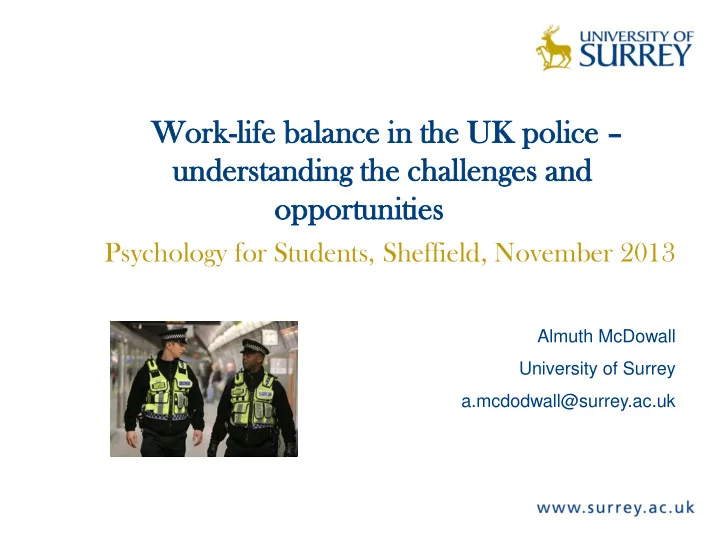

Work ork-lif life e balanc lance e in the e UK pol olice ice – understand derstanding ing the e challenge llenges s and d op opportuni ortuniti ties es Psychology for Students, Sheffield, November 2013 Almuth McDowall University of Surrey a.mcdodwall@surrey.ac.uk
Work-life Balance Who of you has thought about work-life balance?
A child’s view
WLB – a Definition “The individual perception that work and non- work activities are compatible and promote growth in accordance with an individual’s current life priorities” ( Kalliath and Brough, 2008, p.326)
Why am I concerned with WLB in my research? • Big concern to employers – more important as a health concern than work-related stress (GriD, 2012) • Regional variation in UK! • Decades of research don’t equal decades of good solutions
UK Police: Challenges for WLB Spending review → Operational and Organizational changes, regional variation High risk job, work-family conflict potential cause for burnout Bad press Need to develop research with practical implications , “things are dire” mind -set not helpful for individuals Need prevention and cure
An officer in his words
Gaps in WLB research • Focus on conflict: linked to work and non-work outcomes, health and performance • Little research on actual interventions • Need more specific research on organisational contexts – much focus on professional dual earners • Promising new areas: • Boundary styles. Volleyers, Integraters (Kossek et al., 2012) • Facilitation (Frone, 2003): apply skills in different areas of your life, transfer of learning
Current research • Understanding work-life balance as KSAs: what skills, knowledge and abilities do people need? • Any difference between groups? • Which KSAs are most important for the police? • What can people do to facilitate their WLB?
Method Large modernising UK force Survey analysis Card sort for initial to cluster validation and refine Behaviour elicitation through interviews
Findings in summary • Competencies ranged from broad to narrow • Context specific: for instance NOT taking work home effective boundary management in this population – potentially confidential and also intrusive work • All competencies important, for instance managing (others’) expectations, managing flexibility, keeping things in perspective • Separate competence for line managing WLB in others
Implications • Theoretical: WLB understood as KSAs, gap in the literature so far. Competencies models widely used in practice, not reflected in research to date • Practical: screening, training, raising self awareness. Empowering, not limiting • Future research: further validation, different occupations, is there a ‘global WLB KSA model’?
The opportunities for the Police • Practical applications of this research: – Screening – Training – Raising self awareness • Empowering, not limiting • Onus on the person and the organisation
What I learned from this research • Had to persevere to get it published – Can be tricky to try something new! • Reflection on my WLB, and also reflection on assisting other organisations • Renewed appreciation that policing is not an easy job!
Bit about me • Fulltime academic & consultant • Chartered Psychologist • Editor • Chair Division of Occupational Psychology • Set up working group on Work-life Balance in 2009 with Professor Gail Kinman
My path to psychology Brief stint in retail Love Business Dance Psychology Time in Recording Studio Personal Instruction
My three top tips • Study into psychology if you love people • Consider occupational psychology if you love business • Persevere and frame challenges as opportunities!
Thank you! • A.mcdowall@surrey.ac.uk
Recommend
More recommend